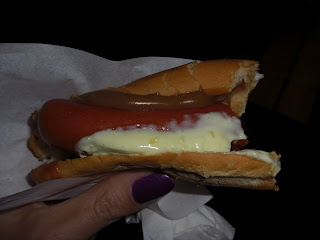So on our first full day in Reyk, we only had one tour planned late in the day (more on that later), so we simply wandered around the city for the morning. We woke at 8am - my body was screaming at me, "What in the hell are you getting up at 4am for?!?!" since we're obviously not quite over the jetlag yet. But after breakfast, we wandered out into the city. It was cloudy and chilly, but the walk was pleasant. We stopped here and there to take pictures (nothing fabulous due to the cloudy day), but Turg and I quickly agreed that it was perfect weather to stop at Saegrefinn (The Sea Baron) for their lobster soup. Again, one of those great hole in the wall places that's been around for ages that locals and tourists alike love to go to because the food is simply that good (and inexpensive).


The lobster soup was everything that we expected and more. It was delicious, rich and the lobster so tender that it melted in your mouth. Definitely the thing for the drizzly day. But as we were sitting there eating, the couple next to us was served this wonderful smelling kabob. (Vegetarians, turn away right now) "What is that??" we asked. It was whale. Seriously, whale - or Moby Dick on a Stick, as we've seen around town. Well, when in Iceland...

I have to say, the whale was really quite good. It's heavy, kind of a cross between tuna and a beef steak both in taste and in texture. It had the briny-ness that one would expect of something out of the sea, but the meatiness of a mammal. Although, one would think that eating whale meat would be verboten, as was explained to us by a later tour guide, whaling, along with other types of fishing is done in a sustainable manner. After centuries of whaling, a ban was put into place on hunting whale. This ban had unexpected consequences - it depleted the cod and smaller fish population on which Iceland is almost wholly dependent, since the whale population grew so much. So now, they've reinstituted whale hunting (on non-endangered whale only) in a certain fishing radius, and with strict quotas to maintain sustainability of both the whale and fish populations. Okay lesson in sustainability over.

The next chapter of our travels... BEER!



















.jpg)













